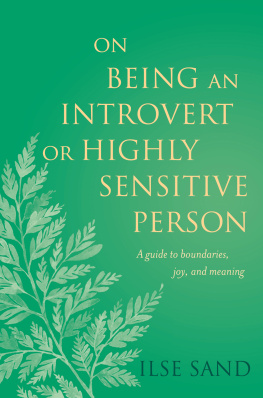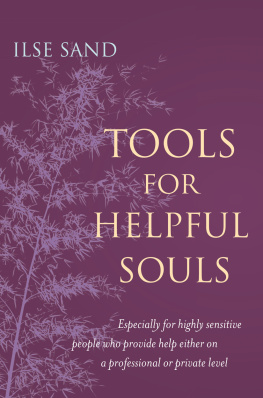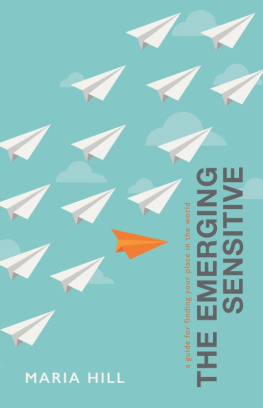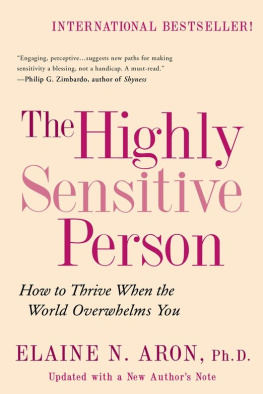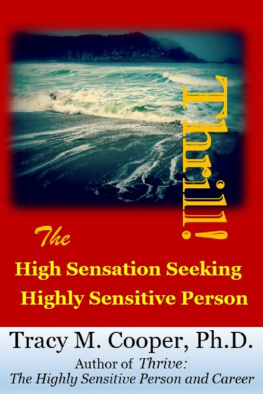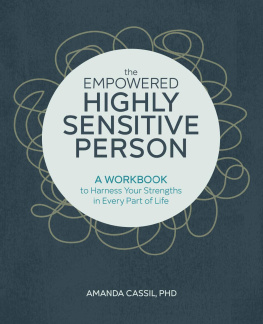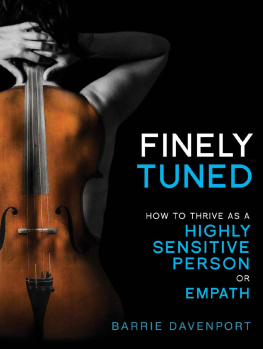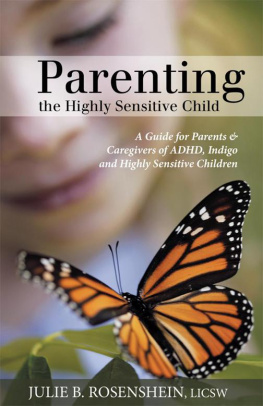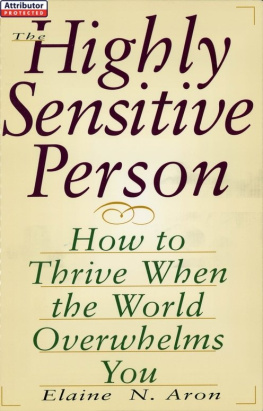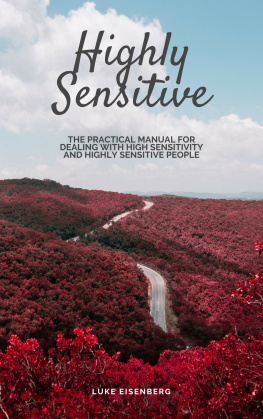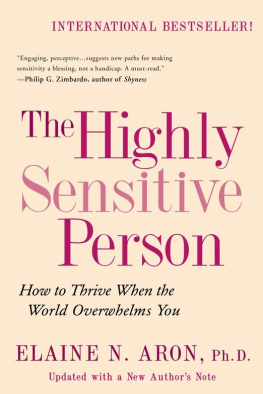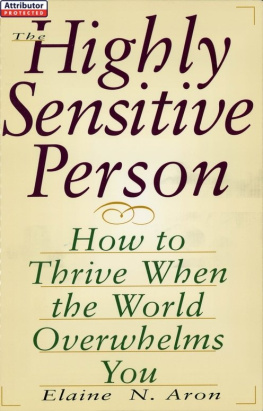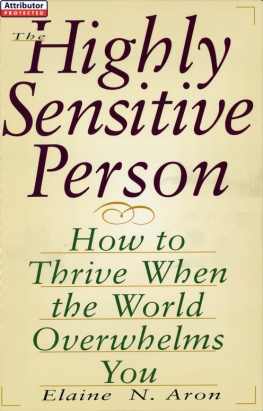
O N B EING AN
I NTROVERT
OR H IGHLY
S ENSITIVE
P ERSON
A guide to boundaries, joy, and meaning
I LSE S AND

Jessica Kingsley Publishers
London and Philadelphia
C ONTENTS
P REFACE
My first book, Highly Sensitive People in an Insensitive World: How to Create a Happy Life , was published for the first time in 2010 and has become a bestseller in a number of countries.
Since then, I have listened to many highly sensitive people and introverts in my practice as a psycho-therapist and when I have held lectures on the subject. They have told me about their challenges, and I have advised them on the strategies that can be used in different situations. And as an introvert and a highly sensitive person, I have also gained new personal insights that I share in this book.
This book is written for highly sensitive people and introverts. However, its advice and instructions are also quite applicable to people who are, temporarily or for some other reason, in a sensitive situation for example, because of stress, trauma, or burn-out.
The first chapter describes the introverted personality type, the highly sensitive trait, and the high-reactive temperament.
The following chapters contain good advice and concrete suggestions for how to set boundaries, protect yourself against over-stimulation, stand up for yourself, enjoy the company of others in your own way, and find joy and meaning.
At the conclusion of the book, you will find two self-tests to give you an idea of how introverted or sensitive you are.
People are very different, and no one fits 100 per cent into the description of a particular type. You will probably be able to recognise yourself in some parts of the description, while other parts will seem alien to you. You may also find that you benefit from the books advice and instructions even if you do not think you fit entirely into any of the types.
I have tried to write the book in simple, easily understandable language without superfluous info-rmation.
The specific examples I use have, for the most part, been partially fictionalised for educational purposes. They contain typical situations and remarks I have heard over many years in my work as a parish pastor and, later, as a psychotherapist. Some of the examples are authentic. They have been used and made anonymous with the permission of the person concerned.
When I use the word extrovert in this book, I mean it precisely in the sense first described by C.G. Jung. When the American psychologist and researcher Elaine Aron uses the term highly sensitive, socially extrovert, she does not mean exactly the same thing. All highly sensitive people possess a great deal of introversion. I shall elaborate on this in .
I NTRODUCTION
I am so pleased to see how it has become more and more accepted and legitimate in recent years to be an introvert or a highly sensitive person. It was not always this way.
My grandfather, Planter Sand, came to Tversted a dune plantation in the northern-most part of Denmark in 1946. He landscaped the Tversted lakes, built paths and bridges, put up benches, and made the place into a popular excursion site. He was an extrovert and could hardly take a walk down to the lakes without meeting someone he fell into conversation with and invited home. It was important to him that everyone felt welcome to drop by the caretakers house, which was close to the lakes, for a cup of coffee or to borrow the telephone. Many people availed themselves of the hospitality including acquaintances who had summerhouses in the nearby town of Skiveren.
My grandmother was an introvert. Among people she did not know well, she was quiet and reticent. I remember that she had a very special relationship with her chickens. I still recall how she spoke to them in a bird language as she entered the chicken coop, creating an atmosphere of harmony and intimacy. When surprise guests came to the caretakers residence, you could see how artificial her smile was. Once, just as she was absorbed in washing the dishes, clad in a filthy apron with her hair in a mess, the former Prime Minister of Denmark Jens Otto Krag suddenly appeared in the living room. My grandfather, of course, was delighted by the distinguished visit, while my grandmother smiled her artificial smile.
We all admired my grandfather. He was someone people noticed in part, because on many occasions he gladly rose to give a speech and he had something nice to say to everyone. His desire for company was easily aroused, and his ability to make contact with strangers was formidable. My grandmother, on the other hand, we often viewed as sad and negative. Over the years, she was tormented more and more by arthritis and, at the end, could not even turn her head. She had to live a completely different life from the one she wanted and had the talent for. It was too bad that none of us could see and recognise how hard she struggled to survive in an environment in which she was forced into far more sociability than she had the desire or energy for.
My grandfather was interested in the church and, for many years, was the head of the local church council in Tversted. Therefore, it was an important event for him when I got my first parish. He travelled down to Djursland with good ideas for example, about how I could set up benches in the parsonage garden so the congregation could go for walks and enjoy sitting and gossiping on the benches. Instead, I put up a picket fence between the garden and the churchyard. I am an introvert and wanted my garden in peace.
When I applied for a job as parish pastor in Djursland, I had not realised that I was an introvert. But I discovered quickly that the expectations of how extroverted I was supposed to be in the parish were beyond my abilities.
I had replaced a pastor who had the habit of turning up unannounced on major birthdays, saying, Hello, its the vicar. Happy birthday. The complaints that I did not do the same came quickly. But, for me, turning up unannounced was far too great a challenge. If I drop into festive company I do not know, I become awkward and stiff and before I have even turned around, I have used up my energy resources for several days. Even though I put together grief support groups and made much of pastoral care, nevertheless there were remarks about how I did not participate in the birthday of this person or that person throughout my years at the parish.
It was a gift for me to discover the concept of introversion. I now understood that I was neither lazy nor wrong: I was an introvert, and my talents lay elsewhere. This new knowledge gave me self-confidence and helped give me the courage to leave my civil-servant position as a parish pastor and step into new and untried pastures as an independent psychotherapist.
After I read the description of highly sensitive people by American psychologist Elaine Aron, I found that it supplemented my understanding of myself as an introvert, so that I became even clearer to myself. My shame at being different again diminished. It was good to know there were others like me and I became convinced that those who had seen me as whining, self-absorbed, selfish, or lazy had viewed me wrongly.
Later, it became my mission to help others to have greater faith in themselves by learning about their personality type, to come to terms with their weaknesses, and to recognise their strengths.
Now I hope that this book may be a help for introverts and highly sensitive people who are even today sometimes viewed as grumpy or arrogant, for example when they take the time they need to compose themselves.
Next page
